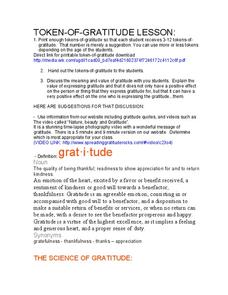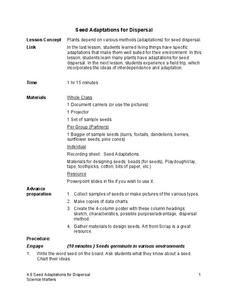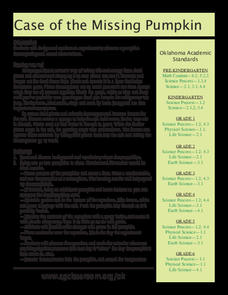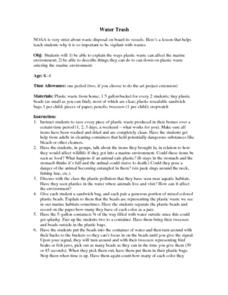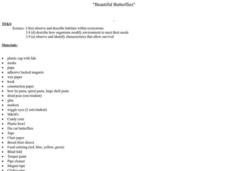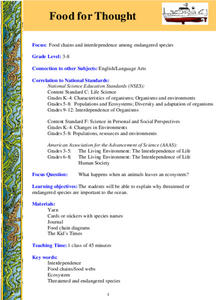Laboratory for Atmospheric and Space Physics
Looking to the Future
New Horizons set forth on a mission to Pluto in 2006. Ten years later, the spacecraft is still on its way. Here, enthusiastic scholars predict what they will be like—likes, dislikes, hobbies, etc.—when New Horizons arrives at its...
Spreading Gratitude Rocks
Token of Gratitude
What would the world be like if everyone expressed gratitude? Pupils explore the concept by watching a motivating time-lapse video. Scholars express appreciation by handing out tokens of gratitude, and then write about their...
Science Matters
Basic Needs
Scholars take part in a grand conversation about the basic needs of living things. Working collaboratively, pupils brainstorm and identify similarities to come to the conclusion that the environment meets the needs of all living...
Science Matters
Seed Adaptations for Dispersal
After a grand conversation about seeds, adaptation, and dispersal, scholars work collaboratively to examine seeds and record their findings on a four-column chart. Small groups share their observations and further discuss seed...
Space Awareness
What is Time?
Does it ever seem like time is slipping through your fingers? Model the passing of time with an hourglass activity in which individuals determine whether hourglasses are the most efficient way to measure time.
Miami-Dade County Public Schools
Honoring All Who Served Veterans Day
November 11th, Veterans Day, is a holiday set aside to honor all those who have served in the military. Here's a resource packed with ideas, activities, projects, and materials that will provide inspiration for ways to celebrate those...
Curated OER
Case of the Missing Pumpkin
Scientists define and discuss decomposition, and watch pumpkins decompose and return to soil in classroom experiment. They record the date the experiment began, chart changes in pumpkins on a calendar, count how many days it takes...
Museum of Tolerance
Artifact Research Activity
Artifacts give us the privilege of learning about the past, may it be family, culture, or traditions. Here, class members learn about their family's past with the help of an artifact, or family heirloom. Once an artifact is...
Institute of Electrical and Electronics Engineers
Adaptive Device Design
After reading about how engineering has made adaptive devices possible for people with disabilities, pupils work in groups to discuss different devices to determine whether or not they are adaptive. They also disassemble a pair of...
California Academy of Science
Natural Resources Bingo
Bingo isn't just a silly game, it's a great way to practice all types of skills. After reviewing that the earth is composed of natural resources, what those natural resources are, and sustainability, the class plays a game of bingo. The...
K12 Reader
World Climates
Why is weather different around the world? Learn about world climates with a reading comprehension passage. Kids read a short passage before answering five comprehension questions based on context clues.
Curated OER
Signal Flags and Codes
Students make sets of nautical signal flags and use them to communicate in the classroom.
Curated OER
Invertebrates
Young scholars identify insect body parts and look for local insect life. They create an insect using recycled material and design a classroom mural with bug facts. They study Monarch butterflies and dragonflies.
Curated OER
Birth, Growth, And Development
Students understand that all living things have a life cycle that includes being born, developing into an adult, reproducing, and eventually dying.
Curated OER
Water Trash
Students explain the ways plastic waste can affect the marine environment. They are able to describe things they can do to can down on plastic waste entering the marine environment.
Curated OER
Beautiful Butterflies
Third graders study the life cycle of the butterfly through this series of activities. They create projects, play games, and observe butterfly characteristic that contribute to their survival.
Curated OER
Make an Edible Coral Reef
Students create an edible coral reef out of food and candy. In this Science lesson, students explore what a coral reef is and the coral reef's importance to the ecosystem. Additionally, students discover the different parts of a...
Curated OER
Your Own Greenhouse
Young scholars discuss the similarities between the Earth's atmosphere and a greenhouse. In this science lesson, students make their own greenhouses out of plastic bottles and thermometers. Young scholars record the temperature different...
Curated OER
Homes for Hermit Crabs
Young scholars discover the differences between hermit crabs and mollusks and identify their parts. After reading a story about hermit crabs, they complete an anatomy worksheet. For another activity, students fold and cut a diagram of a...
Curated OER
Plant Diversity and Distribution
Students construct a defined plot on school grounds and observed patterns in plant life. They count trees, shrubs, cacti and record on a data sheet. They compare data and generate a plant diversity overlook for their school.
Curated OER
Truly Amazing Mammals
Explore the world of amazing mammals with your kids with special needs. Each child identifies one mammal from a previous lesson and writes a short paragraph on that mammal. This lesson states that it is intended for all levels, but not...
Curated OER
This Just in! Nile Network News Update
Have your young reporters research contributions of the ancient Egyptians, draft scripts, and broadcast their stories live on the Nile Network News. Depending on class size and age, topics may be brainstormed or assigned. The detailed...
Curated OER
Food for Thought
Students explore the food chains in a variety of ecosystems and its relationship to the survival of threatened or endangered marine animals or fish in the ocean. The interdependence of the species is investigated in this lesson.

